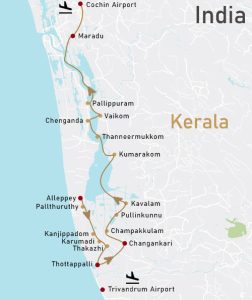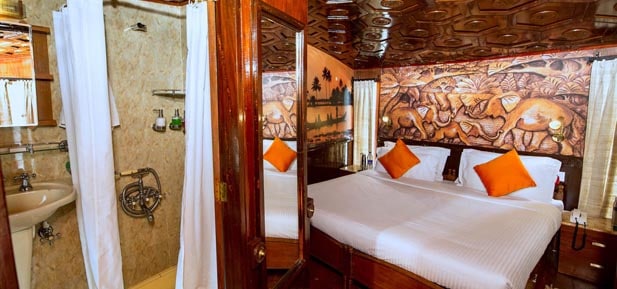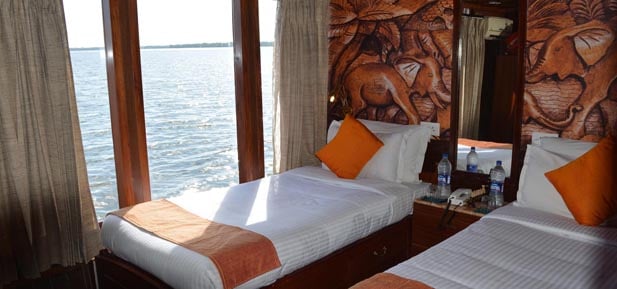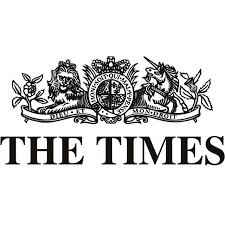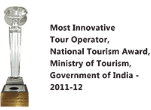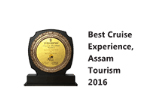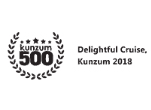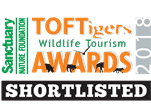Day 1: Changankari
Arrive in Changankari, the remote serene and pleasant village. Our welcoming team on-board will help you with smooth check-in, followed by the safety briefing. After lunch we set sail, cruising the waterways through the scenic rural villages, relaxing on the boat.
Meal Plan: (L, D)
Day 2: Changankari – Champakkulam – Mankompu
Excursion to Aranmula
After early breakfast, we drive to an ancient village, Aranmula, famous for its metal mirrors. The technical know-how behind the making of this unique metal mirror is confined to only some households of master craftsmen in Aranmula. These mirrors have the distinctive feature of 100% reflection unlike the common mirror. These mirrors are unique to this locale and haven’t yet been replicated anywhere else in the world.
We will then visit the ancient temple of Lord Krishna “Aranmula Sree Parthasarthy Temple”. The story goes that the temple had its idol brought here in a raft made with “Aru (six)” pieces of “Mula (bamboo)”. This is what gave the place Aranmula its name as well. Dedicated to the Hindu Deity Lord Krishna, the temple is situated on the banks of the Pamba River.
We will have a traditional lunch at a beautiful house of a local family, situated along the bank of Pampa River- which comes alive with the pageantry of ornated boats (Palliyodom) and the rhythmic songs of oarsmen onboard, every year during the annual festival ’Onam’ (August/September).
Post lunch we will visit the institute intended for promotion and presentation of Traditional Architecture and Mural Painting. We drive back to board our boat and will sail to Champakkulam village. Kerala’s old spice trade used to pass through this town enroute to Cochin and other ports on the west coast. Champakkulam settled more than 1000 years ago by Syrian Christian traders, who later converted to Roman Catholicism under the Portuguese. We will visit the St. Mary’s Church, one among the oldest churches in Kerala, the St. Mary’s Church or Champakkulam Church in Alappuzha is believed to be one of the seven established by St. Thomas in AD 427.
As we stroll along we can meet the school children, local people and the local artisans who sculpt biblical heroes. Cruise to Mankompu village where we will witness a cultural performance. Dinner on board.
Meal Plan: (B, L, D)
Day 3: Mankompu – Kainakari – Kavalam
This day after breakfast we cruise to Kainakari. We will take the country boat to cruising through the narrow canals, get closer to the laid-back, yet harmonious, life along the way.
Stop by Chavara Bhavan, the ancestral home of the Saint Chavara, the first canonized Catholic male saint of Indian origin, the co-founder of the first congregation for men, the Carmelites of Mary Immaculate – C.M.I, and of Congregation of the Mother of Carmel C.M.C. He had dedicated his life for the upliftment of the poorest among the poor. Now this house is preserved as a museum.
Return to the boat. Have Lunch onboard, while cruising to Kavalam, where the river reverses its course and drain into Lake Vembanad. You may take the ferry to explore the region, walk along the dykes surrounding the expanses of paddy fields and interact with the farmers and the members of the women’s collective-‘Kudumbha shree’.
As we cruise, along the way we interact with toddy tappers and watch how they collect the sap of coconut palm and make the alcoholic beverage–Toddy! We continue the cruise till dusk, through the remote interiors of Kavalam.
Dinner on board.
Meal Plan: (B, L, D)
Day 4: Kavalam – Kumarakom
By early morning, we set out by country boat to explore the migratory and endemic birds of Kumarakom, which is a cluster of lagoons of Vembanad wetland eco-system at the backdrop of mangroves, paddy fields and coconut groves. It is home to Waterfowls, Cuckoos, Owls, Egrets, Herons, Moor hens, Cormorants, Gulls, Terns, Skimmers, Storks, Vultures, Storks, larks, flycatchers, wood beetle, and many more.
This afternoon, we will visit the house of a Syrian Christian family for a home hosted lunch. This house is located on an island which was made by the men of the house, by reclaiming land from Backwaters. A walk in the farm will be educative. The hostess will demonstrate the preparation of traditional Syrian Christian cuisine. You may also try your hand at cooking and listen to the story of her family, the laborious work of three generations of men and equally strong women who supported their pioneering spirit.
Return to our boat and cruise to Thanneermukkom.
The barrage at Thanneermukkom built across Vembanad, the largest lake of Kerala, divides the lake into two; one half with perennial salty water and the other with fresh water enriched by rivers. Relax on the boat, enjoying the soothing breeze and the exuberance of the energy that the majestic lake is spreading around. Dinner on-board.
Meal Plan: (B, L, D)
Day 5: Kumarakom – Chenganda – Vaikom
After breakfast we sail to Chenganda village. The people of this rustic village are having a laid-back and peaceful life. We visit the village spending time with the coir weavers, the shell harvesters and farmers, engaging in conversation with them about the riparian life, and watching various indigenous techniques of fishing. Coir, one of the major exports of Kerala, is of much relevance today than ever before when plastic has become a global menace. People of Chenganda are major suppliers of this cottage industry.
We drop the anchor at the ancient village, Vaikom. We visit a cultural centre to watch Kathakali, the traditional dramatic and mimetic dance form, which plays stories from epics. It is a unique blend of dance, music, action, literature and make-up.
Enjoy a short tuk-tuk ride to the ancient temple of Shiva. The architecture of temples in Kerala is based on ancient science of construction and geographical features of the land. As per the traditional architecture, each element of temple represents an element of human body and, a temple is not only the space for spiritual enlightenment but also the venue for harmonious social networking. Return to boat and relax. Tonight, we celebrate our sojourn over farewell dinner on board.
Meal Plan: (B, L, D)
Day 6: Vaikom – Pallippuram – Cochin
We disembark at the ancient village ‘Pallippuram’, at the border of Cochin city. Take a leisurely walk in this old village and hear about the history of the filial church of 2nd AD.
The 5 Nights’ cruise concludes after watching the traditional Martial art(Kalarippayattu) at the nearby village. By road we visit a Kalari – the traditional training centre for authentic Martial art (Kalarippayattu). Kalarippayattu in Kerala has its origin from the ancient Indian scripture, Dhanur Veda. This training helps to understand the 107 energy points in human body, learn the practices to maintain the normal flow of the energy and to heal ailments by Marma therapy. The exercises help to gain stamina, flexibility, calibrated functioning of body and mind, and quick reflexes required for self-protection.
The south-west corner of a Kalari houses the guardian deity of the Kalari. The seven tiers symbolise the seven abilities that each person must possess: Strength, Patience, Power to command, the posture, the expression and the Sound. Flowers, incense and water are offered to the deity every day. Before starting the day’s practice, it is the norm for practitioners to pray to the deity. There is also a Guruthara inside all Kalari, where a lamp is kept burning in reverence to all the gurus (masters) of the Kalari.
Meal Plan: (B)
